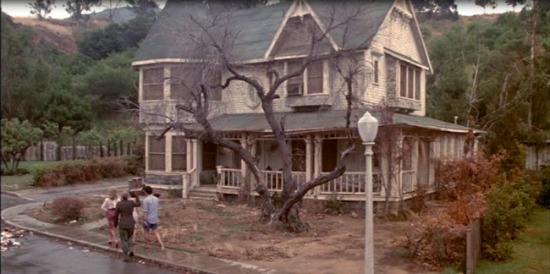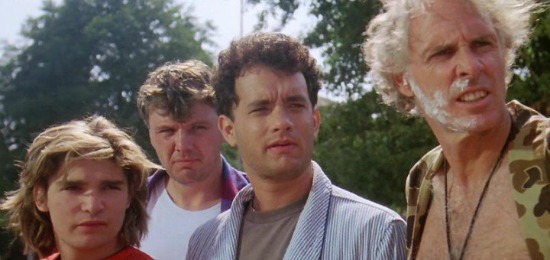Branched out from our universe, there is an alternate, bizarre-world offshoot of 1970s Hollywood history in which Brian de Palma directed Taxi Driver, starring Jeff Bridges as Travis, George Lucas directed Apocalypse Now in a modest handheld, black-and-white, cinéma vérité style and Frank Sinatra’s Dirty Harry Calahan asked a wounded bankrobber reaching for a gun "Do you feel lucky? Well, do ya, Bozo?" One of the most mind-warpingly compelling near-misses of this neververse was a version of Steven Spielberg’s Close Encounters Of The Third Kind written by everyone’s favourite Bresson-loving Calvinist Paul Schrader. In Schrader’s predictably more severe interpretation, the protagonist was to be a Saul/St Paul surrogate who works for the government debunking UFO sightings before an encounter with a bright light in the sky converts him into a believer, a zealot. This defiantly theological blockbuster – and likely audience repellent – eventually foundered over a basic disagreement between Spielberg and Schrader over the director’s fetish for American suburbia. As Spielberg worked to relocate the soul of the movie from the arthouse to the multiplex, the two men clashed. Schrader said, "I refuse to send off to another world, as the first example of Earth’s intelligence, a man who wants to go and set up a McDonald’s franchise." Spielberg replied, "That’s exactly the guy I want to send."
And, with Schrader’s departure, that’s exactly what we got (as well as one of the finest movies of the decade). The suburbs define normality for the film’s hero, Roy Neary, an everyman father, husband and neighbour whose spare time, we hear, involves miniature golf and block socials. Neary’s undistinguished suburban life is the dull, flat base that throws the abnormal and extraordinary into stark relief. It’s the sudden dimming of the lights in acres of tract homes that signals the arrival of the aliens. It is also from the perspective of nosy, judgmental neighbours that Neary’s embarrassing post-contact breakdown is deprecated, as he brings his garbage into his house to recreate the vision of the Devil’s Tower that has been planted in his mind. In the synopsis that prefaces the script he ended up writing himself (with contributions from Hal Barwood and Matthew Robbins), Spielberg’s description of Neary’s "whole life going to pieces" includes the telling observation that "his neighbors won’t talk to him." In Spielberg’s world, that’s important.
Spielberg’s evocation of the suburbia he had experienced growing up in his own childhood – and simultaneous invocation of a kind of ur-suburbia of the imagination for a whole generation of children around the world, regardless of whether they lived in the suburbs or not – would reach its apotheosis in E.T., in which the landscape of tract housing (accommodating those then specifically American, but soon to be universal practices of trick-or-treating and BMXing) encloses and suffuses the whole story. Whether or not you actually lived in America, or even in a housing estate, the setting was familiar. Eliot’s room was just a neater version of your bedroom, or more likely the bedroom of a friend with well-to-do parents who could afford lots of Star Wars toys. Spielberg had created a definitive cinematic locale, on a par with the wide-open prairies of the Western, or the cramped, angular, and shadowy spaces of the film noir. This space of the imagination would became a staple of 1980s cinema, accommodating almost every genre.
With the colossal commercial success of E.T. behind him, Spielberg seemed to want to climb out of the genre honeypot he’d created and, for much of the 1980s (aside from his return to the Indiana Jones films), he strained towards a bland, sanitary worthiness befitting Oscar recognition. At the same time, rather than completely abandoning the lucrative suburban cinescape he’d carved out, to be exploited by others, he leased it out to collegial filmmakers to make the films his burgeoning respectability couldn’t be seen with. Under the umbrella of his Amblin production company, we got Tobe Hooper’s Poltergeist, Richard Donner’s The Goonies, and Robert Zemeckis’s Back To The Future, all to a greater or lesser extent bearing the mark of their patron.
The most interesting tenant in Spielberg’s suburban domain was Joe Dante. A graduate of the Roger Corman school of low-budget, seat-of-the-pants filmmaking, Dante had already created two horrors that didn’t take themselves seriously (Piranha and The Howling) when he was chosen to direct Gremlins, a 1984 film about a lovable little creature that spawns monstrous siblings who bring anarchy to a small town. The original intention was to create a dark horror, but, under Dante’s direction, the film careens giddily from horror tropes to a Hellzapoppin’ mania. It’s exactly the sort of batshit crazy that Spielberg flirted with in 1941, but dropped and walked away from permanently when that film broke his string of blockbusters.
Sometimes there’s a tendency to see the Amblin films as part of Spielberg’s authorship – certainly that notion helped the studio’s marketing department in selling the films – but the differences between Spielberg and the directors of the Amblin films (especially Dante) are often marked. Whereas Spielberg alternately tries to escape from the genre backwaters or aggrandise the form, Dante wilfully celebrates the cheap, lowbrow, exploitative, televisual or cinematic roots of genre. The polished verisimilitude of E.T. gives way to designedly B-movie artificiality of Gremlins. Whereas the suburbs of E.T. are a benign container, with no bad neighbours, and no immediate threat until the government’s alien hunters arrive, in Dante’s film, there’s something already wrong with Kingston Falls long before the Gremlins begin their rampage. There’s the paranoid and xenophobic Mr Futterman struggling with PTSD. There’s the Christmas-hating good girl whose father, dressed as Santa, got trapped coming down the chimney only to be discovered days later when the smell of decomposition took over the house. There’s the dog-hating owner of the bank, Mrs Deagle, who is happily foreclosing on the mortgages of the locals. In a community that’s already this tightly wound, the anarchy of the Gremlins is ultimately a kind of welcome liberation.
By the end of the 1980s, interest in the suburbs as a cinematic locus was dwindling. Spielberg had moved on and was oscillating between films designed to attract Oscars and ones designed to entertain efficiently. At just this moment, Dante returned to this setting.
Recently released on Blu-ray, The ‘Burbs is an underappreciated comedy about a group of neighbours who begin to suspect that the new strange-looking and odd-sounding people next door – the Klopeks – are murderers. Ray Peterson (Tom Hanks), Rumsfield (Bruce Dern) and Art Weingartner (Rick Ducommun) are Spielberg’s suburban kids grown up – though really in a state of arrested development, still with a longing to explore mysteries and have adventures, but with all the cuteness worn away and the precocity replaced by wholesale underachievement. In fact, they are arseholes. What little joy they get in life they seem to derive from ogling their friends’ wives, savouring the emasculation of their neighbours, and imagining they alone embody some great American heroic archetype.
The suburbs remain a heartland, but whereas for Spielberg they allow access to adventure and wonder, for Dante they’re an open prison for dangerous human idiosyncrasy. The denizens are oddballs, screw-ups, no-hopers, dopes, cowards, bullies – at best smug, better-than-you mediocrities like Hanks’s Ray Peterson. The always edgy Bruce Dern is like a once-scalded cat in the role of Rumsfield, a Vietnam vet looking for trouble everywhere. Rick Ducommun – a familiar face from bit parts in some very big films – is the loud-mouth whose tale of gruesome murders in the quiet suburbs pushes our “heroes” to persecute their new neighbours. As funny as they are, Ray, Art, and Rumsfield are unlovely creatures. Even the resourceful, adventuresome kids of the Spielberg-directed or produced films have devolved into the doofus-y Ricky Butler. E.T. wouldn’t have made it into one backyard in this neighbourhood without being brained with a shovel and chucked back over the fence for somebody else to deal with.
On the other hand, the odd and seemingly villainous Klopeks are a little like the Gremlins – a strange, superficially threatening force that actually pushes the townsfolk into action, lifting them (albeit temporarily) out of the drudgery and inanity of their everyday routine. The ‘Burbs benefits from the inspired casting of Henry Gibson – a master in combining soft-spoken and unsettling – and the gargoyle-like Brother Theodore as the weird brothers Klopek. Dante works wonders with the sound design for the film, always throwing in a raven’s caw whenever we see the creepy Klopek residence, and gracing the entrances of the bumfuzz Klopek nephew, Hans (Courtney Gains), with the buzzing of flies. Just as the Gremlins manifest the anti-establishment impulses the people of Kingston Falls repress, the Klopeks somehow manifest the good neighbourly qualities the people of Hinckley Hills are patently lacking. [Spoiler alert] Sure, they turn out to be murderers, but they’re also quiet and keep to themselves. The crimes the movie judges most harshly are the small mindedness, vulgarity, prejudice, intrusiveness and gossipy speculation of Hanks and co.

By the end of the film, the neighbourhood is a sprawling crime-scene filled with emergency vehicles and Hanks has become, at least in his own mind, the cowboy hero who has put the world to rights. With a Gary Cooper-esque drawl, he says to young Ricky, “I want you to keep an eye on the neighbourhood for me,” like he’s deputising a marshall.
Just 12 years after the unassuming Roy Neary was chosen by the aliens as the representative of mankind they most wanted to meet, the only heroics possible in the suburbs are vapid acts of self-mythologising. One year after Dante’s film was released, Martin Scorsese would openly mock the whole idea of the suburbs as a place of any cinematic interest at the end of Goodfellas. We track past construction machinery to the front door of a tract home and meet wise-guy-turned-rat Henry Hill (Ray Liotta) picking up his newspaper on his porch, wanly smiling as he narrates the nightmare of his incarceration in the ‘burbs. “There’s no action. I have to wait around like everyone else… An average nobody. I get to live my life like a schnook.” Joe Pesci’s lethally volatile Tommy De Vito points his gun through the camera at us and pulls the trigger repeatedly, putting us out of our brief suburban misery.
The ‘Burbs is out on DVD now from Arrow Films


